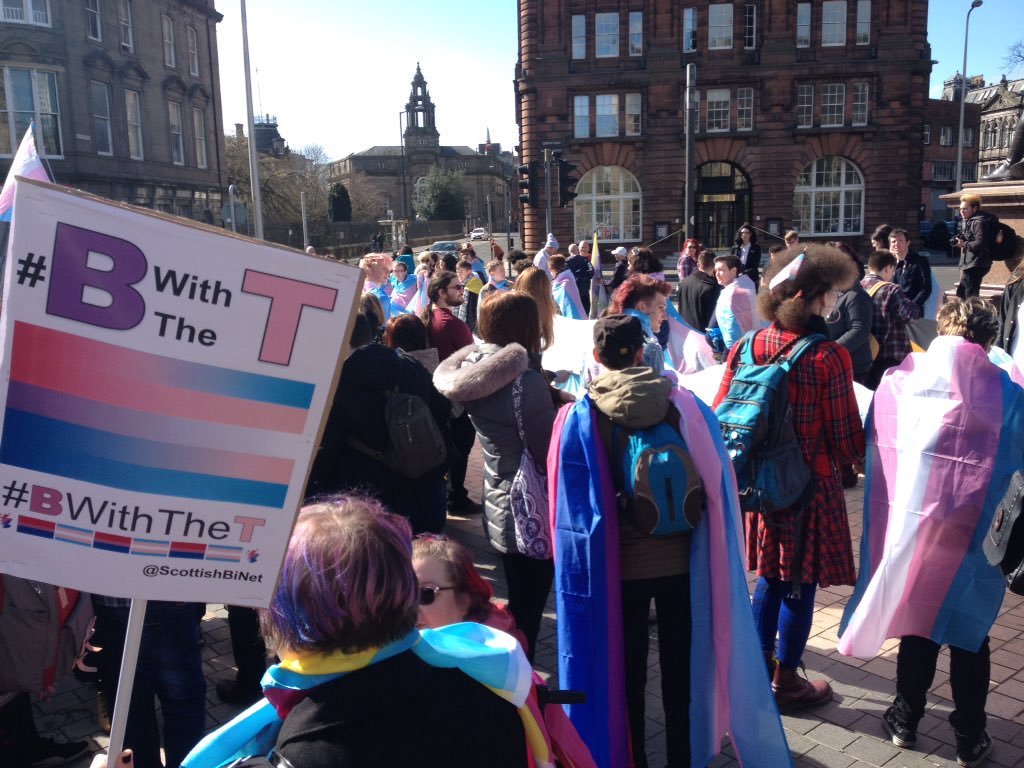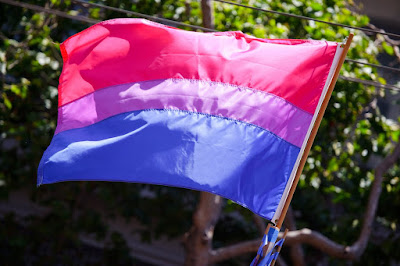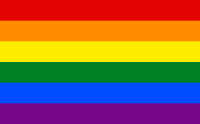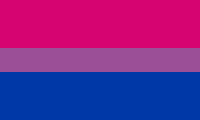Usually we’re lucky if we get one film a year, with Moonlight and Call Me By Your Name bringing award-winning bi+ representation to our screens in the past couple of years.
This year, twenty-bi-teen is living up to its name. The awards season is coming to a close with the Oscars tonight, and for the first time in a long while, there’s not just a singular film with bi+ representation, but a whole collection of them!
Bohemian Rhapsody is the story of Freddie Mercury, and Queen’s, meteoric rise to fame, culminating in their historical performance at Live Aid in 1985.
The three of us that founded Scottish Bi+ Network went to see this film together, and the gasp when he said the word ‘bisexual’ was audible in a full cinema screen. It’s so rare to hear a character use the word, and especially in film. (TV is definitely better when it comes to characters actually saying the word.)
Rami Malek won a BAFTA and a Golden Globe for his portrayal of Freddie Mercury, and is also nominated for Best Leading Actor at the Oscars. In addition, the film has five Oscar nominations, including Best Picture, two wins at the Golden Globes, plus two wins and five nominations at the BAFTAs.
The Favourite is a period drama about the reign of Queen Anne, her health failing, and her close friend, Lady Sarah, governs the country in her stead. When a new servant, Abigail, arrives, her charm endears her to Sarah.
It’s a beautifully shot film, with all the surreal absurdity that people have come to expect from a Yorgos Lanthimos film. The film focuses on three complex and fascinating women, with three exceptional actresses bringing them to life. Being a period drama, no-one says the word bisexual, but the character of Lady Sarah (Rachel Weisz) is shown to have relationships with women and men.
The film has a whopping ten Oscar nominations, including Best Picture, Best Leading Actress for Olivia Coleman, and Best Supporting Actress for Rachel Weisz and Emma Stone. As if that wasn’t enough Olivia Coleman won Best Leading Actress at the Golden Globes, with another four nominations including two in the Best Supporting Actress category. Add to that five nominations and seven wins at the BAFTAs, including Best Supporting Actress for Rachel Weisz, Best Leading Actress, and Outstanding British Film of the Year.
Colette is the true story of Gabrielle Colette, who is a ghost writer for her husband’s novels, but after their success, Colette fights to be recognised as the author of the books, challenging the gender stereotypes of her era.
It’s refreshing to see a character who is unapologetic about their attraction to multiple genders. Colette (Kiera Knightley) is shown persuing relationships with both men and women throughout the film, including a relationship with a character who could be described as non-binary by today’s standards. Again, because it’s a period film, no-one uses the words bi, trans, or non-binary, which either didn’t exist then, or weren’t used the way we currently do. There are two trans actors in the supporting cast, and a sense of queerness and challenging gender norms is woven throughout the whole film.
It’s an independent film, so it hasn’t caught the eye of the big award ceremonies, but the film has four nominations from the British Independent Film Awards.
Disobedience follows Ronit (Rachel Weisz) as she returns to her Orthodox Jewish community that shunned her for her attraction to a female childhood friend. Once home, their passions reignite as they explore the boundaries of faith and sexuality.
So, my favourite thing of this year so far is definitely Rachel Weisz and the wonderfully complex bi+ characters that she’s portrayed. The film itself is understated, focusing on the characters, and brought to life by the powerful performances from the three leads. The chemistry between Ronit and Esti (Rachel McAdams) is beautifully portrayed, and their passion shines through in every scene.
The film is a low budget independent film, so it’s not on the radar of the big award ceremonies, but the film has one win and four nominations from the British Independent Film Awards.
Lizzie is a thriller based on the infamous 1892 murders of the Borden family.
The film focuses on Lizzie Borden (Chloë Sevigny), and her relationship with the maid, Bridget (Kristen Stewart, who is openly bisexual), in the period leading up to the murder of her parents. The film is bloody, and it deals with some heavy themes, but the two lead actresses do a convincing job of bringing the characters to life and showing the societal constraints that women lived under at that time. Lizzie is shown to have no interest in men, but it is stated in the text at the end of the film that Bridget went on to have a relationship with a man. It’s possibly because Bridget’s character is played by Kristen Stewart that I personally read her as bi.
Another relatively low budget independent film, nominated for the Grand Jury Prize at Sundance.
 
Honourable mention: A Star is Born is the story of a musician who helps a young singer find fame, while age and alcoholism send his own career into a downward spiral.
Full disclosure: I haven’t seen the film. As far as I am aware, the film itself doesn’t have bi+ characters or themes, but it stars Lady Gaga, who is openly bisexual, and she has been nominated for Best Leading Actress at the Oscars, the Golden Globes, and the BAFTAs. And that’s in addition to her two wins and three nominations at the Grammys.
 
And finally, for those of you that prefer the comfort of your own sofa to the big screen, Netflix has you covered.
Velvet Buzzsaw is a horror thriller about an unknown artist discovered after his death, but a supernatural force takes vengeance against those who profited from his work.
Stylish and fun, Jake Gyllenhaal is no stranger to playing bi+ characters, and he’s utterly mesmerising as Morf Vandewalt.
Films on streaming services very rarely get included in awards ceremonies, but it’s a fun watch if you like horror films, and don’t mind a little blood and gore.
 
Even with all the bi+ characters that are making their way to our screens this year, very few actually use the word, and there’s a lack of male characters that are shown to be attracted to multiple genders.
There’s also still a notable lack of trans, non-binary, and BAME bi+ representation, as well as films that don’t focus on same-sex relationships (usually female).
This increasing trend of bi+ visibility is a step in the right direction, and I hope we don’t have to wait too long for the day when all of the bi+ community gets to see themselves represented on screen.
 
For more information about the films, and for content/trigger warnings, please see the relevant IMDb page:
Bohemian Rhapsody
The Favourite
Colette
Disobedience
Lizzie
A Star Is Born
Velvet Buzzsaw















